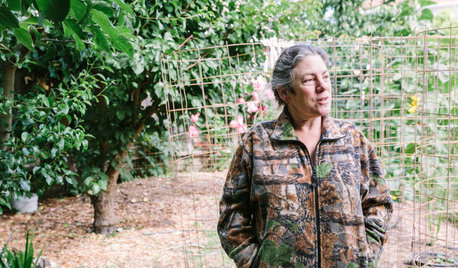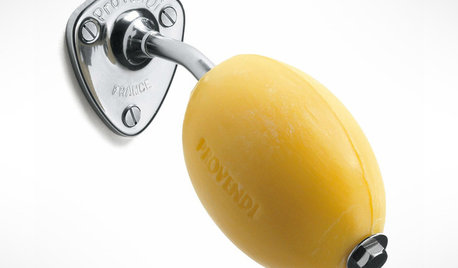Organic food is better?
TheMasterGardener1
11 years ago
Featured Answer
Sort by:Oldest
Comments (150)
pnbrown
11 years agolast modified: 9 years agowayne_5 zone 6a Central Indiana
11 years agolast modified: 9 years agoRelated Discussions
Whole Foods Market 'Organic' food made in China
Comments (5)Well let me tell you about China, since I just returned from living there for 2 years. Our dog food is 1,000% better then the crap you get there. After eating there for 2 years, I have about $10,000 worth of damage to my teeth because of 3 cracked teeth and 1 tooth which came out. The Chinese do not use a band saw to cut their meat but instead use a meat cleaver which leaves bone fragments in the meat. When you bite into the meat, which is in every dish you get, you will crack your teeth when you hit one of the bone fragments. Those pictures of an animal being cut up, is right next to the veggies and there are flies all over going from the bloody meat to the raw veggies which you will be eating tonight. I had to return back to the US after 2 years because my gastrointestinal tract finally gave out from eating their unsanitary food and I needed to seek medical attention. I went from 210 pounds 6'2" to 155 in a few months. There is ZERO quality control over their package goods. Eating something out of a box was like eating "Cracker Jacks" because you never know what the surprise inside is going to be. The Chinese never complain and just accept it, because there is no one to complain too. Their veggies are grown on the worse polluted soil I have ever seen. It is like eating raw veggies grown on top of fresh raw sewage. Anything that comes from China, stay away from at all cost!...See MoreIs organic better ask a fruitfly
Comments (4)While I applaude this youg lady's drive and initiative, its also sad to me that we have to have scientific research to back up what should be common sense before many people will listen. That in and of itself speaks to a larger issue about our society. My wife and I used to have the same argument about the cost of organic foods, but they taste so much better, and seem to fill us up quicker, therefore we eat less, so to me the higher price is balanced out. Not to mention in the long run we'll save money simply because we'll be healthier....See MoreOrganic is more nutritious - article
Comments (20)I researched that claim a bit a couple years ago, Frank. I don't recall all the details, but concluded the claim was somewhat accurate, but also somewhat meaningless. Part of the equation is different plant varieties. Most of what the big farms grow are hybrids and these hybrids were not bred with nutritional content in mind, but rather shipping/storage/uniformity type qualities. So, nutritional content has decreased *in some cases* from this. Other issues are produce that is harvested before fully ripe. This doesn't allow the full development and thus not the full nutrient value. There were other reasons why this is sometimes the case, but in no case is it due to the soil or the method of growth (conventional vs organic). Plants just don't work that way. If the plant doesn't have what it needs to grow well, then it doesn't ;) AFAIK, things like how ripe the produce is at harvest, how long it takes to get to market, how processed it is, and variety all play a much more significant role in nutritional content in produce than does the farming method....See Moreanother reason organic is better
Comments (23)Posted by anthony_toronto (My Page) on Fri, Jul 6, 07 at 0:47 I remember seeing a CNN news story some years back about a study on organic vs. non-organic fruits and vegetables. I know they were not looking for differences in flavanoids, but they were looking at taste, and whether non-organic fruits and veggies retained any traces of pesticides or other non-organic compounds. The results of that study were that there were no differences between organic vs. non-organic in terms of either taste or in residual pesticides, etc. So, non-organic fruits and veggies were not found to be less healthy than organic fruits and veggies. HOWEVER, the study did find that, because of typical organic gardening techniques, the organic fruits and vegetables had a far higher concentration of e-coli bacteria from fecal matter used as fertilizer. The study determined that eating organic fruits and vegetables was far more dangerous that eating non-organic fruits and vegetable. I have always been less concerned about the effects of the using the blue stuff (which I'm sorry really does not seem materially different in any way as an effective fertilizer) than I have been with growing my tomatoes in feces. Oh well, maybe e-coli is not a problematic substance to consume. That was a John Stossel report on ABC, and they rescinded some of their statements (one or two, as I recall), as well as the conclusion that was drawn that non-organically grown produce was healthier than organically grown....See Morewayne_5 zone 6a Central Indiana
11 years agolast modified: 9 years agomyluck
11 years agolast modified: 9 years agoeric_wa
11 years agolast modified: 9 years agoTheMasterGardener1
11 years agolast modified: 9 years agodavid52 Zone 6
11 years agolast modified: 9 years agoTheMasterGardener1
11 years agolast modified: 9 years agogardenlen
11 years agolast modified: 9 years agoeric_wa
11 years agolast modified: 9 years agowayne_5 zone 6a Central Indiana
11 years agolast modified: 9 years agoTheMasterGardener1
11 years agolast modified: 9 years agodavid52 Zone 6
11 years agolast modified: 9 years agopnbrown
11 years agolast modified: 9 years agowayne_5 zone 6a Central Indiana
11 years agolast modified: 9 years agoTheMasterGardener1
11 years agolast modified: 9 years agoeric_wa
11 years agolast modified: 9 years agoTheMasterGardener1
11 years agolast modified: 9 years agoTheMasterGardener1
11 years agolast modified: 9 years agoelisa_z5
11 years agolast modified: 9 years agoTheMasterGardener1
11 years agolast modified: 9 years agoTheMasterGardener1
11 years agolast modified: 9 years agopnbrown
11 years agolast modified: 9 years agowayne_5 zone 6a Central Indiana
11 years agolast modified: 9 years agopnbrown
11 years agolast modified: 9 years agodavid52 Zone 6
11 years agolast modified: 9 years agowayne_5 zone 6a Central Indiana
11 years agolast modified: 9 years agoTheMasterGardener1
11 years agolast modified: 9 years agoTheMasterGardener1
11 years agolast modified: 9 years agoeric_wa
11 years agolast modified: 9 years agoeric_wa
11 years agolast modified: 9 years agoTheMasterGardener1
11 years agolast modified: 9 years agoeric_wa
11 years agolast modified: 9 years agoTheMasterGardener1
11 years agolast modified: 9 years agopnbrown
11 years agolast modified: 9 years agoTheMasterGardener1
11 years agolast modified: 9 years agoTheMasterGardener1
11 years agolast modified: 9 years agoTheMasterGardener1
11 years agolast modified: 9 years agopnbrown
11 years agolast modified: 9 years agoeric_wa
11 years agolast modified: 9 years agoeric_wa
11 years agolast modified: 9 years agoTheMasterGardener1
11 years agolast modified: 9 years agoTheMasterGardener1
11 years agolast modified: 9 years agoeric_wa
11 years agolast modified: 9 years agoeric_wa
11 years agolast modified: 9 years agoeric_wa
11 years agolast modified: 9 years agopnbrown
11 years agolast modified: 9 years agodavid52 Zone 6
11 years agolast modified: 9 years agopnbrown
11 years agolast modified: 9 years agoTheMasterGardener1
11 years agolast modified: 9 years ago
Related Stories

FEEL-GOOD HOMEIs Your Bedroom Designed for a Good Night’s Sleep?
Find out how the right nightstands, bedding, rugs, TV and storage can help you get more restful slumber
Full Story
KITCHEN DESIGNLove to Bake? Try These 13 Ideas for a Better Baker's Kitchen
Whether you dabble in devil's food cake or are bidding for a bake-off title, these kitchen ideas will boost your baking experience
Full Story
MOVINGRelocating? Here’s How to Make the Big Move Better
Moving guide, Part 1: How to organize your stuff and your life for an easier household move
Full Story
MOST POPULARThree Magic Words for a Clean Home and a Better Life
Not a natural tidying and organizing whiz? Take hope in one short phrase that can change your life forever
Full Story
FARM YOUR YARDTo Get the Food They Believe In, These Urbanites Grow Their Own
Home gardeners farming on their city lots find that local, organic food isn’t the only reward
Full Story
HOUSEKEEPINGTackle Big Messes Better With a Sparkling-Clean Dishwasher
You might think it’s self-cleaning, but your dishwasher needs regular upkeep to keep it working hard for you
Full Story
COMMUNITY15 Ways to Make Your Neighborhood Better
Does your community lack ... well, a sense of community? Here's how to strengthen that neighborly spirit
Full Story
GARDENING FOR BUTTERFLIES3 Ways Native Plants Make Gardening So Much Better
You probably know about the lower maintenance. But native plants' other benefits go far beyond a little less watering and weeding
Full Story
LIFE11 Tiny Tricks That Make Life a Tad Better
Make these small tweaks to your home and daily routine, and life will be easier, less rushed and maybe healthier too
Full Story
BATHROOM VANITIESBetter Places to Stash That Soap
Banish gloppy bars and flimsy pumps, and the only things you’ll need to clean are your hands
Full StorySponsored
Zanesville's Most Skilled & Knowledgeable Home Improvement Specialists



prestons_garden